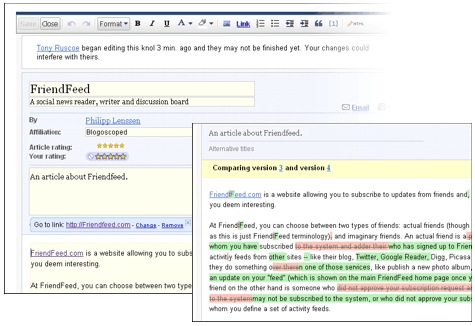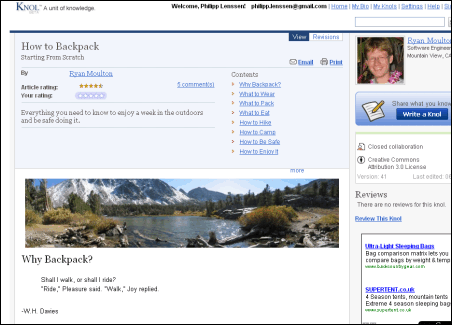Wednesday, July 23, 2008
Google Knol Is Live
Google went live with Knol, a platform to read and write articles on all kinds of subjects. Knol was being tested privately since some time and had been pre-announced back in 2007. The address is knol.google.com, but notably not knol.com or knol.org or even googleknol.com. This project is somewhat reminiscent of Wikipedia, though there are many differences as well. You may also think of this as an alternative to creating a small info website if your aim is to cover only a single subject.
When you log-in within your Google account to write an article on a subject you’re familiar with, you’ll use the kind of live-layout editor typical for Google (and much easier to use than Wikipedia’s editor). For every article you can also choose your licensing, your collaboration, and your advertising model. For instance, you can connect an article to your AdSense account – this triggers a verification process. You can pick a license; either a Creative Commons Attribution license, or a Creative Commons attribution non-commercial license, or the old-style “all rights reserved.” And for collaboration, you can pick open (everyone who’s signed in can edit), moderated (everyone can suggest edits but you or another author will be able to approve these before they would go live – this is the default setting), and closed (meaning only owners – i.e. admins – and authors can edit).

Editing a page, and visualizing article revisions
Right now, a lot of the existing Knols – Google defines a knol as a “unit of knowledge”, and perhaps this will be how people name articles hosted on Knol too – deal with subjects of a more serious or scientific nature, like health. (Google’s help page says you can write “(Almost) anything you like,” adding that you pick the subject “and write it the way you see fit” as they don’t edit knols nor do they “try to enforce any particular viewpoint”... subject to the terms of service and their content policy, which disallows e.g. images containing nudity, and “spam,” a rather broad term in this case. You may also not write anything commercial if you’re in “Cuba, Iran, Burma (Myanmar), North Korea, Syria, or Sudan,” Google says.)
Other articles, like the frontpage-featured “How to Backpack”, are of a lighter nature, but still very long and detailed. (I’ve started a collaborative stub covering FriendFeed.) On that note, even the URL is quite long, and includes the owner’s name... a peculiar choice for collaborative pages, and a potential barrier if you consider going for the open collaboration model, as people may associate other people’s edits with yours.
Naturally, the current articles are just the site’s seeding – it remains to be seen in what direction it grows. The quality of wikis and other projects hoping for user participation often depend on a good community spirit, which in turn often reflects a company’s karma... and usually, that’s the sum of that company’s past actions.
Reading an article, there is a nice table of contents featured on top. The header section in general takes up quite a bit of space for Knol articles. Considering the focus of these articles is to get a point across, the font for the main content that follows is awkwardly small. On articles there are now a couple of review features for other users, even when you don’t have the permission to hit the Edit button on top: you may be able to comment; you can rate an article; you can flag it as inappropriate; and last not least, you can review it. When you start a review, the Knol editor as usual opens – slightly sluggish at this time, as are some other parts of the site (with its dynamic, on-page JavaScript reloads), though these may be launch effects – and you can add your opinions. Peer review is something known especially from the science community, which the Google co-founders Larry Page and Sergey Brin know well too (peer review even allegedly inspired Larry Page to create the back-links counting PageRank algorithm which led to their “Backrub” engine, and later, Google search).
If we do want to compare this project to Wikipedia, then perhaps we can think of Knol, at least at this time, as slightly more top-down than the bottoms-up, everyone-can-edit Wikipedia.org. While more and more Wikipedia too is adding restrictions and special rights, their original spirit could perhaps be summed up with “by and large people want to do good, and many small, even hasty edits, add up to a by and large great quality.” And then perhaps Google Knol’s stance is more like, “someone’s responsible for an article, changes will be owner-approved by default, and people’s actions will be rated.” Using a biography page and a real name is suggested as well, and Google offers a verification method (you can verify via your mobile phone, or a credit card... at least the latter method was broken when I tried).
Let’s see how these two models compare against each other; there’s a lot to be won by allowing everyone to quickly do edits, but a more tightly controlled model may have benefits as well. And perhaps all those people complaining about Wikipedia – or who had Wikipedia articles they started be deleted, as Wikipedia does not allow all kinds of entries – will now consider Knol a potential new home for research and sharing. And there’s another big difference to Wikipedia: at Knol you’ll potentially get paid, through the AdSense ads. Which would mean that the more popular your article, among other factors, the higher your revenues. And Google gets a share of these revenues, naturally (even when Google Knol is listed as an entity separate from AdSense with a 0% share in the process)... though I’m not so sure exactly how they aim to pay collaborators on articles. Money can be an incentive but may also cause friction. It’ll be interesting to watch where this project goes; and even if you may prefer the Wikipedia style of collaborative publishing, it seems a little competition can’t hurt.
[Thanks Hebbet and Manoj Nahar!]
>> More posts
Advertisement
This site unofficially covers Google™ and more with some rights reserved. Join our forum!


